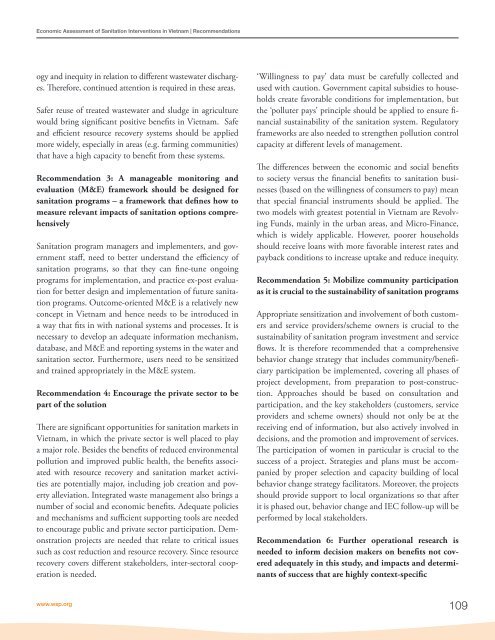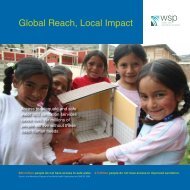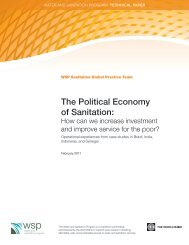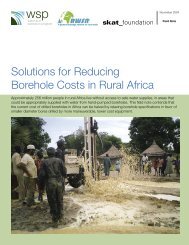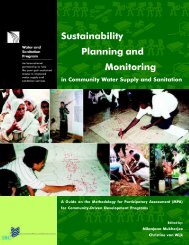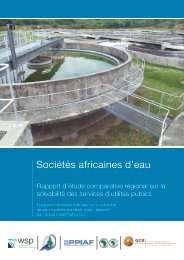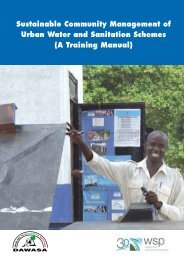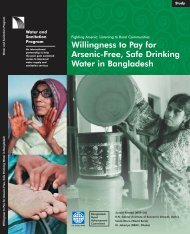Economic Assessment of Sanitation Interventions in Vietnam - WSP
Economic Assessment of Sanitation Interventions in Vietnam - WSP
Economic Assessment of Sanitation Interventions in Vietnam - WSP
Create successful ePaper yourself
Turn your PDF publications into a flip-book with our unique Google optimized e-Paper software.
<strong>Economic</strong> <strong>Assessment</strong> <strong>of</strong> <strong>Sanitation</strong> <strong>Interventions</strong> <strong>in</strong> <strong>Vietnam</strong> | Recommendationsogy and <strong>in</strong>equity <strong>in</strong> relation to different wastewater discharges.Therefore, cont<strong>in</strong>ued attention is required <strong>in</strong> these areas.Safer reuse <strong>of</strong> treated wastewater and sludge <strong>in</strong> agriculturewould br<strong>in</strong>g significant positive benefits <strong>in</strong> <strong>Vietnam</strong>. Safeand efficient resource recovery systems should be appliedmore widely, especially <strong>in</strong> areas (e.g. farm<strong>in</strong>g communities)that have a high capacity to benefit from these systems.Recommendation 3: A manageable monitor<strong>in</strong>g andevaluation (M&E) framework should be designed forsanitation programs – a framework that def<strong>in</strong>es how tomeasure relevant impacts <strong>of</strong> sanitation options comprehensively<strong>Sanitation</strong> program managers and implementers, and governmentstaff, need to better understand the efficiency <strong>of</strong>sanitation programs, so that they can f<strong>in</strong>e-tune ongo<strong>in</strong>gprograms for implementation, and practice ex-post evaluationfor better design and implementation <strong>of</strong> future sanitationprograms. Outcome-oriented M&E is a relatively newconcept <strong>in</strong> <strong>Vietnam</strong> and hence needs to be <strong>in</strong>troduced <strong>in</strong>a way that fits <strong>in</strong> with national systems and processes. It isnecessary to develop an adequate <strong>in</strong>formation mechanism,database, and M&E and report<strong>in</strong>g systems <strong>in</strong> the water andsanitation sector. Furthermore, users need to be sensitizedand tra<strong>in</strong>ed appropriately <strong>in</strong> the M&E system.Recommendation 4: Encourage the private sector to bepart <strong>of</strong> the solutionThere are significant opportunities for sanitation markets <strong>in</strong><strong>Vietnam</strong>, <strong>in</strong> which the private sector is well placed to playa major role. Besides the benefits <strong>of</strong> reduced environmentalpollution and improved public health, the benefits associatedwith resource recovery and sanitation market activitiesare potentially major, <strong>in</strong>clud<strong>in</strong>g job creation and povertyalleviation. Integrated waste management also br<strong>in</strong>gs anumber <strong>of</strong> social and economic benefits. Adequate policiesand mechanisms and sufficient support<strong>in</strong>g tools are neededto encourage public and private sector participation. Demonstrationprojects are needed that relate to critical issuessuch as cost reduction and resource recovery. S<strong>in</strong>ce resourcerecovery covers different stakeholders, <strong>in</strong>ter-sectoral cooperationis needed.‘Will<strong>in</strong>gness to pay’ data must be carefully collected andused with caution. Government capital subsidies to householdscreate favorable conditions for implementation, butthe ‘polluter pays’ pr<strong>in</strong>ciple should be applied to ensure f<strong>in</strong>ancialsusta<strong>in</strong>ability <strong>of</strong> the sanitation system. Regulatoryframeworks are also needed to strengthen pollution controlcapacity at different levels <strong>of</strong> management.The differences between the economic and social benefitsto society versus the f<strong>in</strong>ancial benefits to sanitation bus<strong>in</strong>esses(based on the will<strong>in</strong>gness <strong>of</strong> consumers to pay) meanthat special f<strong>in</strong>ancial <strong>in</strong>struments should be applied. Thetwo models with greatest potential <strong>in</strong> <strong>Vietnam</strong> are Revolv<strong>in</strong>gFunds, ma<strong>in</strong>ly <strong>in</strong> the urban areas, and Micro-F<strong>in</strong>ance,which is widely applicable. However, poorer householdsshould receive loans with more favorable <strong>in</strong>terest rates andpayback conditions to <strong>in</strong>crease uptake and reduce <strong>in</strong>equity.Recommendation 5: Mobilize community participationas it is crucial to the susta<strong>in</strong>ability <strong>of</strong> sanitation programsAppropriate sensitization and <strong>in</strong>volvement <strong>of</strong> both customersand service providers/scheme owners is crucial to thesusta<strong>in</strong>ability <strong>of</strong> sanitation program <strong>in</strong>vestment and serviceflows. It is therefore recommended that a comprehensivebehavior change strategy that <strong>in</strong>cludes community/beneficiaryparticipation be implemented, cover<strong>in</strong>g all phases <strong>of</strong>project development, from preparation to post-construction.Approaches should be based on consultation andparticipation, and the key stakeholders (customers, serviceproviders and scheme owners) should not only be at thereceiv<strong>in</strong>g end <strong>of</strong> <strong>in</strong>formation, but also actively <strong>in</strong>volved <strong>in</strong>decisions, and the promotion and improvement <strong>of</strong> services.The participation <strong>of</strong> women <strong>in</strong> particular is crucial to thesuccess <strong>of</strong> a project. Strategies and plans must be accompaniedby proper selection and capacity build<strong>in</strong>g <strong>of</strong> localbehavior change strategy facilitators. Moreover, the projectsshould provide support to local organizations so that afterit is phased out, behavior change and IEC follow-up will beperformed by local stakeholders.Recommendation 6: Further operational research isneeded to <strong>in</strong>form decision makers on benefits not coveredadequately <strong>in</strong> this study, and impacts and determ<strong>in</strong>ants<strong>of</strong> success that are highly context-specificwww.wsp.org109


